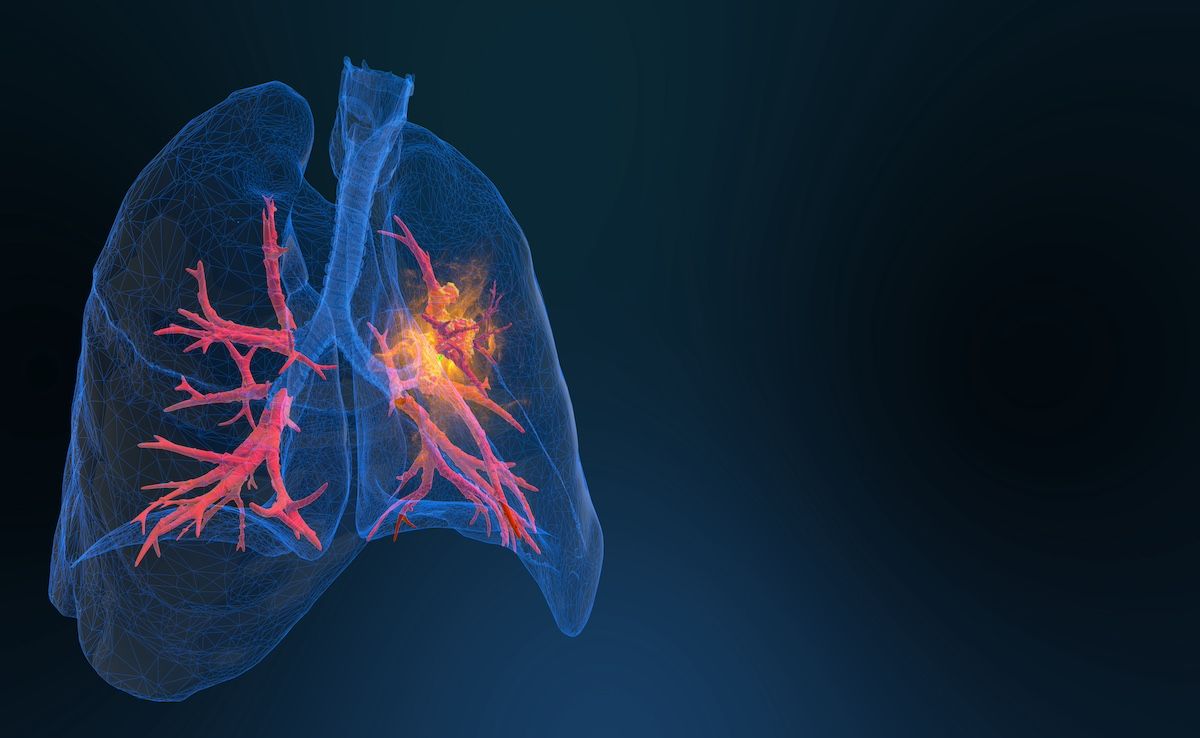- Center on Health Equity & Access
- Clinical
- Health Care Cost
- Health Care Delivery
- Insurance
- Policy
- Technology
- Value-Based Care
Sunvozertinib NDA Submitted to FDA for NSCLC
A new drug application (NDA) has been submitted to the FDA for sunvozertinib in pretreated EGFR exon 20–positive advanced non–small cell lung cancer (NSCLC).
OncLive® first published this article.
A new drug application (NDA) has been submitted to the FDA for the approval of sunvozertinib (DZD9008; Dizal) for the treatment of patients with locally advanced or metastatic non–small cell lung cancer (NSCLC) harboring EGFR exon 20 insertion mutations, as detected by an FDA-approved test, whose disease has progressed on or after platinum-based chemotherapy.1
The NDA is supported by data from part B of the phase 2 WU-KONG1 trial (NCT03974022), which were presented at the 2024 ASCO Annual Meeting. Findings showed that patients treated with sunvozertinib at a 300-mg dose (n = 107) achieved a best overall response rate (ORR) of 53.3% (97.5% CI, 42.0%-64.3%) and a confirmed ORR of 44.9% (97.5% CI, 34.0%-56.1%). Best responses comprised complete response (CR; 2.8%), confirmed CR (1.9%), partial response (PR; 50.5%), confirmed PR (43.0%), unconfirmed PR (3.7%), stable disease (36.4%), and progressive disease (7.5%). Response was not evaluable in 2.8% of patients.2
The median duration of response (DOR) was not reached, and the 9-month DOR rate was 57%. Notably, the respective best ORRs for patients who received prior treatment with amivantamab-vmjw (Rybrevant) and those who did not were 50% and 53.8%, respecitvely.
Safety findings on sunvozertinib from this analysis confirm earlier data, which show that only 6.3% of patients discontinued treatment. | Image Credit: © appledesign-stock.adobe.com

“We are encouraged by the potential of sunvozertinib as a single oral agent to improve outcomes for patients with EGFR exon 20 [insertion mutation–positive] NSCLC,” said Xiaolin Zhang, PhD, CEOof Dizal, in a statement.1 “The filing for approval of sunvozertinib marks Dizal’s first NDA submission to the FDA, which represents an important step forward as we continue our efforts to address unmet medical needs globally. We look forward to working closely with the FDA on their review of our application.”
In August 2023, China’s National Medical Products Administration approved sunvozertinib for the treatment of adult patients with locally advanced or metastatic NSCLC harboring EGFR exon 20 insertion mutations whose disease has progressed on or following platinum-based chemotherapy, based on data from the phase 2 WU-KONG6 trial (NCT05712902).3
WU-KONG1 was an international trial that enrolled patients with locally advanced or metastatic NSCLC harboring EGFR exon 20 insertion mutations that were confirmed by local or sponsor-designated laboratory testing.2 Prior treatment with platinum-based chemotherapy was required, and patients needed to have an ECOG performance status of 0 or 1.
Initially, patients were randomly assigned 1:1 to receive sunvozertinib at 200 mg per day or 300 mg per day. An interim analysis was conducted after 39 patients in each cohort underwent at least 2 assessments per RECIST 1.1 criteria. After the interim analysis, subsequent patients were enrolled to cohort 2 to receive the agent at 300 mg per day. Treatment continued until discontinuation criteria were met.
ORR per independent review committee (IRC) assessment served as the trial’s primary end point. Key secondary end points included IRC-assessed DOR and investigator-assessed ORR and DOR.
Patients treated at 300 mg (n = 107) had a median age of 64.0 (range, 37-85) years, and the majority (56.1%) were female patients, had metastatic disease (97.2%), had received less than 2 prior lines of therapy (63.6%), and had an ECOG performance status of 1 (64.5%). EGFR exon 20 insertion mutation subtypes included 769_ASV (20.6%), 770_SVD (19.6%), 773_NPH (6.5%), other (45.8%), and unknown (7.5%).
Regarding safety, findings with sunvozertinib were consistent with previous studies. Treatment-related adverse effects (TRAEs) led to dose reductions in 36.0% of patients and treatment discontinuation in 6.3% of patients.
Most TRAEs were grade 1 or 2, and no TRAEs led to death. The most common grade 3 or higher TRAEs reported in at least 2% of patients consisted of diarrhea (17.1%), increased blood creatine phosphokinase levels (10.8%), anemia (3.6%), rash (3.6%), increased lipase levels (3.6%), decreased neutrophil counts (2.7%), hypokalemia (2.7%), decreased appetite (2.7%), and asthenia (2.7%).
References
1. Dizal submits new drug application to the U.S. FDA for sunvozertinib in treating relapsed or refractory non-small cell lung cancer with EGFR exon 20 insertion mutations. News release. Dizal. November 8, 2024. Accessed November 8, 2024. https://www.dizalpharma.com/news/detail?id=80&search=¤tPage=1
2. Yang JC-H, Doucet L, Wang M, et al. A multinational pivotal study of sunvozertinib in platinum pretreated non-small cell lung cancer with EGFR exon 20 insertion mutations: primary analysis of WU-KONG1 study. J Clin Oncol. 2024;42(suppl 16):8513. doi:10.1200/JCO.2024.42.16_suppl.8513
3. Dizal’s sunvozertinib approved in China NMPA with potential best-in-class therapy in NSCLC with EGFR exon20ins mutations. News release. Dizal. August 23, 2023. Accessed November 8, 2024. http://www.dizalpharma.com/news/detail?id=59
